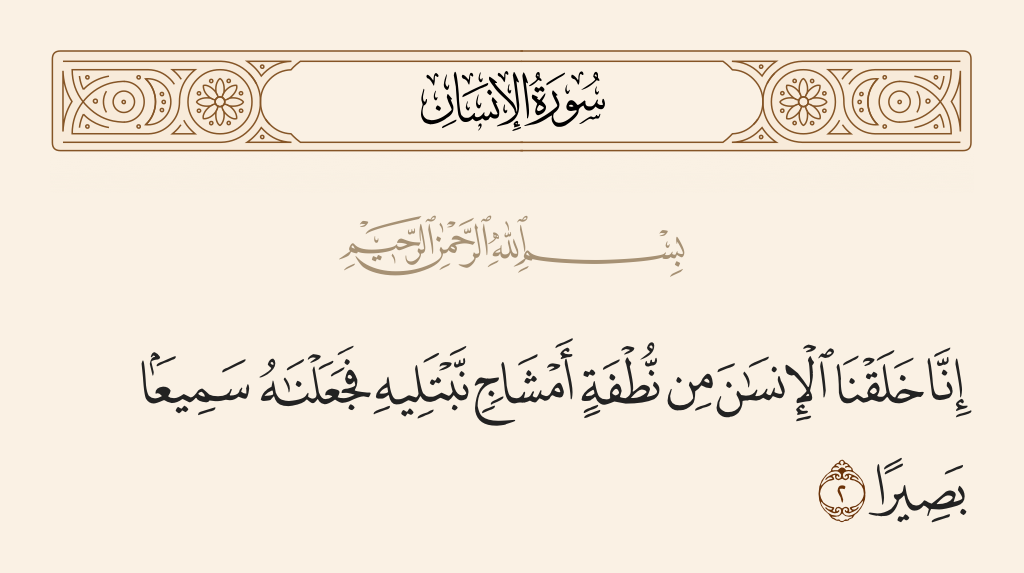Surat Al-Insan Verse No. 2: Reading and listening
Translation of the verse 2 from Surah Al-Insan : Number of verses 31 - - page 578 - Part 29.

﴾إِنَّا خَلَقۡنَا ٱلۡإِنسَٰنَ مِن نُّطۡفَةٍ أَمۡشَاجٖ نَّبۡتَلِيهِ فَجَعَلۡنَٰهُ سَمِيعَۢا بَصِيرًا ﴿
[ الإنسان: 2]
Verily, We have created man from Nutfah drops of mixed semen (discharge of man and woman), in order to try him, so We made him hearer, seer.
English - Sahih International
Indeed, We created man from a sperm-drop mixture that We may try him; and We made him hearing and seeing.
Tafheem-ul-Quran by Syed Abu-al-A'la Maududi
(76:2) Verily We created man out of a drop of intermingled sperm *2 so that We might try him, *3 and We therefore endowed him with hearing and sight. *4
Tafheem-ul-Quran by Syed Abu-al-A'la Maududi
*2) "From a mixed sperm-drop": from the intermingling of the male sperm with the female ovum and not separately from the sperm and the ovum.
*3) This shows man's real position in the world and the position of the world for man. He is not like the trees and animals that the object of his creation be fulfilled on the earth itself, and he should die and perish here after he has played his appointed role over a period of time according to the law of nature. Furthermore, this world is neither a place of punishment for him, as the monks think, nor a place of rewards as the believers of the law of transmigration think, nor a place of entertainment and enjoyment, as the materialists think, nor a battlefield, as the followers of Darwin and Marx think, but in fact it is a place of test and trial for him. That which he regards as his age, is in fact the time given him for the test. Whatever powers and capabilities he has been given in the world, the thing, that have been placed under his control and authority, the various positions and capacities in which he functions, and the relationships that he enjoys with other men, alI these are the countless papers of the test and this test continues till the last breath of his life. The result is not to be announced in this world but in the Hereafter when all his answer-books will have been assessed, decision will be given whether he has come out successful or failed. And his success or tailure wholly depends on what he thought of himself while he functioned here and how he answered the papers that were given him here. If he believed that he had no God, or that he was the slave of many gods, and while answering the papers thought that he was not to be held accountable before his Creator in the Hereafter, his whole lifework went wrong. And if he regarded himself as the slave of One God and worked in the way approved by God, with the accountability of the Hereafter always in view, he stood successful in the test. (This theme has occurred at many places in the Qur'an and has been dealt with at length in the corresponding notes. It is not possible to give all the references, but those who are interested in it may see the explanation of it in its different aspects under "Test and Trial" in the Index. In no other book beside the Qur'an has this truth been explained at such length ) .
*4) The word .sami' (hearing) and basir (seeing) in the original actually imply being "sensible and intelligent". These words of the Arabic language are never used in respect of the animal although it also hears-and sees. Thus, hearing and seeing here do not imply the powers of hearing and seeing which have been given to the animals too, but those means through which man obtains knowledge and then draws conclusions from it. Besides, since hearing and seeing are among the most important means of knowledge for man, only these two have been mentioned briefly; otherwise it actually implies giving man all those senses of the body by which he gathers information. Then the senses given to man are quite different in their nature from those given to animals, for at the back of every sense he has a thinking brain, which collects information gained through the senses; arranges it, draws conclusions from it, forms opinions, and then takes some decisions which become the basis of his attitude and conduct in life. Hence, after saying, "We created man in order to try him," to say, "therefore, We made him capable of hearing and seeing' actually contains the meaning that Allah save him the faculties of knowledge and reason to enable him to take the test. Obviously, if this were not the meaning and the meaning of making man hearing and seeing just implied the one who could hear and see, then a blind and deaf person would stand exempted from the test, whereas unless a person is utterly devoid of knowledge and reason, there can be no question of his being exempted from the test.